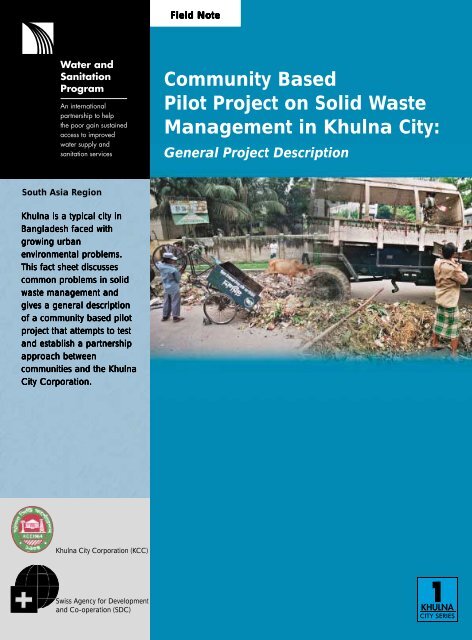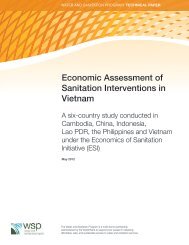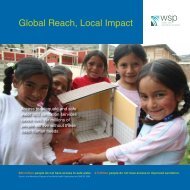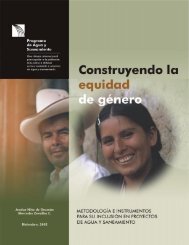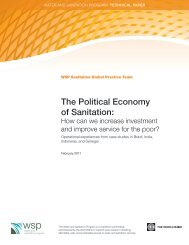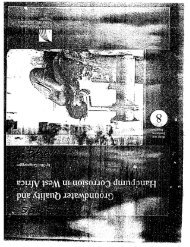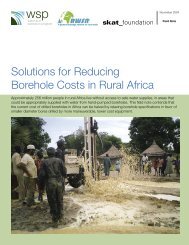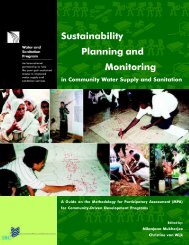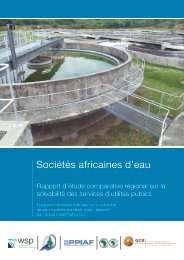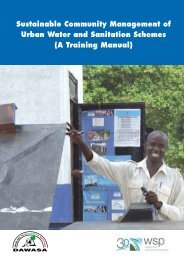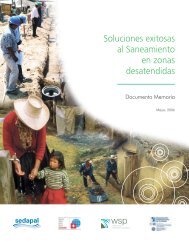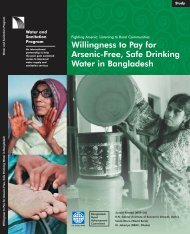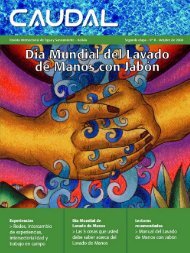Community Based Pilot Project on Solid Waste Management ... - WSP
Community Based Pilot Project on Solid Waste Management ... - WSP
Community Based Pilot Project on Solid Waste Management ... - WSP
Create successful ePaper yourself
Turn your PDF publications into a flip-book with our unique Google optimized e-Paper software.
Field Note<br />
<str<strong>on</strong>g>Community</str<strong>on</strong>g> <str<strong>on</strong>g>Based</str<strong>on</strong>g><br />
<str<strong>on</strong>g>Pilot</str<strong>on</strong>g> <str<strong>on</strong>g>Project</str<strong>on</strong>g> <strong>on</strong> <strong>Solid</strong> <strong>Waste</strong><br />
<strong>Management</strong> in Khulna City:<br />
General <str<strong>on</strong>g>Project</str<strong>on</strong>g> Descripti<strong>on</strong><br />
South Asia Regi<strong>on</strong><br />
Khulna is a typical city in<br />
Bangladesh faced with<br />
growing urban<br />
envir<strong>on</strong>mental problems.<br />
This fact sheet discusses<br />
comm<strong>on</strong> problems in solid<br />
waste management and<br />
gives a general descripti<strong>on</strong><br />
of a community based pilot<br />
project that attempts to test<br />
and establish a partnership<br />
approach between<br />
communities and the Khulna<br />
City Corporati<strong>on</strong>.<br />
Khulna City Corporati<strong>on</strong> (KCC)<br />
Swiss Agency for Development<br />
and Co-operati<strong>on</strong> (SDC)
THE CITY SITUATION<br />
Khulna is the third largest city in<br />
Bangladesh. Situated in flat terrain<br />
with industrial activity in and around<br />
the city, it acts as a gateway to the<br />
nearby sea port of M<strong>on</strong>gla. The city<br />
core, which is about <strong>on</strong>e-quarter of<br />
the total city area, is densely populated<br />
with mostly multi-storied residential<br />
and commercial buildings. The rest of<br />
the city is a mixture of urban and periurban<br />
areas. There are several lowincome<br />
housing areas and slums<br />
located throughout the city.<br />
Khulna City Corporati<strong>on</strong> (KCC) is<br />
resp<strong>on</strong>sible for the operati<strong>on</strong> and<br />
maintenance of municipal services,<br />
including solid waste management.<br />
The City Corporati<strong>on</strong> is headed by an<br />
elected Mayor and operates through<br />
41 elected Ward Commissi<strong>on</strong>ers <strong>on</strong>e<br />
for each of the 31 Wards with an<br />
additi<strong>on</strong>al 10 women Ward Commissi<strong>on</strong>ers.<br />
It is made up of eight<br />
functi<strong>on</strong>al departments and the<br />
c<strong>on</strong>servancy department is resp<strong>on</strong>sible<br />
for solid waste management,<br />
street sweeping, public latrines and<br />
urinals, cleaning of drains, etc. The<br />
solid waste management service<br />
organizes waste collecti<strong>on</strong> from<br />
approximately 1,200 City Corporati<strong>on</strong><br />
mas<strong>on</strong>ry bins, located <strong>on</strong><br />
roadsides throughout the city.<br />
Households are expected to dispose<br />
A busy road in Khulna City<br />
of their waste in the mas<strong>on</strong>ry bins.<br />
The waste is then transported to its<br />
final disposal site (approximately 8<br />
km from the city) by City Corporati<strong>on</strong><br />
trucks.<br />
Heaps of waste remain uncollected<br />
in many parts of the city; KCC trucks<br />
<strong>on</strong>ly pick up waste from the roadside<br />
bins while waste is frequently disposed<br />
in open drains, free land and around<br />
the waste bin sites. It is estimated that<br />
of the 200 t<strong>on</strong>s of waste generated<br />
daily, between a third and a half<br />
remains uncollected. Uncollected<br />
waste blocks drains, causes water<br />
logging and spills over <strong>on</strong> to roads,<br />
often resulting in increased traffic<br />
c<strong>on</strong>gesti<strong>on</strong>. These problems are acute<br />
during the rainy seas<strong>on</strong> especially in<br />
poor neighborhoods which are<br />
frequently located in relatively low<br />
lying areas and have narrow alleys<br />
through which municipal trucks<br />
cannot pass.<br />
The problem of solid waste management<br />
is too extensive for the City<br />
Corporati<strong>on</strong> to manage and they are<br />
heavily dependant <strong>on</strong> grants from the<br />
central government. The c<strong>on</strong>servancy<br />
tax (4% of holding tax) is insufficient<br />
to fund the current level of service. In<br />
1998 income from the tax was <strong>on</strong>ly<br />
Taka 2.7 milli<strong>on</strong> (1 US$ = Taka 50)<br />
while expenditure by the c<strong>on</strong>servancy<br />
department was Taka 17.8 milli<strong>on</strong>.<br />
-2-<br />
Khulna City Profile<br />
Box 1<br />
Estimated<br />
populati<strong>on</strong> (2000) 1.2 milli<strong>on</strong><br />
Populati<strong>on</strong> growth rate 5 % per year<br />
Area<br />
70 sq. km.<br />
Number of<br />
households (1991) 138,000<br />
Number of city wards 31<br />
Low-income<br />
households approx. 30%<br />
Map of Khulna City<br />
GENESIS OF THE<br />
PROJECT<br />
In 1986 Khurram Mahboob launched<br />
a community based initiative to deal<br />
with similar solid waste problems in<br />
his neighbourhood of Kalagaban in<br />
Dhaka city. He motivated local<br />
households to pay for a door-to-door<br />
waste collecti<strong>on</strong> service which resulted<br />
in a significantly cleaner neighbourhood<br />
where drains were no l<strong>on</strong>ger<br />
blocked with waste and the problems<br />
of water logging and mosquitoes were<br />
reduced. The initiative is still working<br />
and has been replicated by several<br />
NGOs in Dhaka city.<br />
The important less<strong>on</strong>s learned<br />
from this initiative were:<br />
! <str<strong>on</strong>g>Community</str<strong>on</strong>g> participati<strong>on</strong> is<br />
indispensable to the success of
solid waste management at the<br />
local level.<br />
! Urban communities, especially<br />
those who rent their properties, are<br />
more “reactive” than “proactive”.<br />
The demand for improved solid<br />
waste management needs to be<br />
facilitated by individuals or<br />
groups.<br />
! Where a reliable service can be<br />
guaranteed the community are<br />
willing to pay for it.<br />
! Municipal waste collecti<strong>on</strong> services<br />
are more effective when they work<br />
in partnership with community led<br />
primary collecti<strong>on</strong> from<br />
households.<br />
The success of the door-to-door<br />
waste collecti<strong>on</strong> initiated by Khurram<br />
Mahboob encouraged the Water and<br />
Sanitati<strong>on</strong> Program (<strong>WSP</strong>) to test its<br />
replicati<strong>on</strong> in other urban areas. They<br />
discussed the c<strong>on</strong>cept for a pilot<br />
project and selected Khulna to test the<br />
scheme because a) the City<br />
Corporati<strong>on</strong> seemed most receptive<br />
to innovative ideas; b) a motivated<br />
NGO (Prodipan), who could lead the<br />
project activities, was based in the<br />
area; c) the problems and complexities<br />
of waste management in Khulna are<br />
representative of those faced by towns<br />
and cities throughout Bangladesh. The<br />
Swiss Agency for Development and<br />
Co-operati<strong>on</strong> (SDC) agreed to<br />
support and fund the pilot project <strong>on</strong><br />
the basis of a proposal submitted by<br />
Prodipan.<br />
THE PILOT PROJECT<br />
The pilot project for community based<br />
solid waste management in Khulna<br />
city was launched in March 1997 with<br />
a scheduled completi<strong>on</strong> date of<br />
December 2000. The estimated cost<br />
is Taka 13.6 milli<strong>on</strong> (US$ 315,500).<br />
The project operates in 6 of the 31<br />
city wards; these were chosen to<br />
represent a cross-secti<strong>on</strong> of the city<br />
areas (built up, peri-urban, slums,<br />
etc.). Prodipan, a local NGO, was<br />
selected to lead the project activities.<br />
Throughout the project Prodipan has<br />
worked closely with communities and<br />
the City Corporati<strong>on</strong> and has been<br />
supported by <strong>WSP</strong> and SDC. Roles of<br />
the different project partners are<br />
shown in box 2.<br />
THE PROJECT PARTNERS<br />
Box 2<br />
Objectives<br />
Communities<br />
(in the project areas)<br />
Khulna City<br />
Corporati<strong>on</strong> (KCC)<br />
Prodipan (NGO)<br />
Swiss Agency for Development and<br />
Cooperati<strong>on</strong> (SDC)<br />
Water and Sanitati<strong>on</strong><br />
Program (<strong>WSP</strong>)<br />
<strong>Management</strong> of the Primary collecti<strong>on</strong><br />
system and c<strong>on</strong>tributi<strong>on</strong> towards its’<br />
cost.<br />
Collaborati<strong>on</strong>, instituti<strong>on</strong>al support and<br />
<strong>on</strong>ward links to municipal systems.<br />
Lead agency to implement the project<br />
activities.<br />
<strong>Management</strong> and project<br />
funding.<br />
Strategic supervisi<strong>on</strong> and technical<br />
support.<br />
The objectives of the pilot project were:<br />
! To gain a strategic understanding<br />
of the urban waste and sanitati<strong>on</strong><br />
situati<strong>on</strong> and to identify a range<br />
of appropriate opti<strong>on</strong>s suitable for<br />
communities who are willing to<br />
share costs and participate in the<br />
management process;<br />
! To make an assessment of social<br />
and ec<strong>on</strong>omic prerequisites and<br />
instituti<strong>on</strong>al changes needed to<br />
incorporate the partnership<br />
approach in municipal service<br />
delivery;<br />
PROJECT STRATEGIES<br />
TEGIES<br />
<str<strong>on</strong>g>Based</str<strong>on</strong>g> <strong>on</strong> previous experience in Bangladesh and comparable developing<br />
countries <str<strong>on</strong>g>Project</str<strong>on</strong>g> strategies were to be:<br />
! resp<strong>on</strong>sive: balancing local needs with wider instituti<strong>on</strong>al, technical and<br />
envir<strong>on</strong>mental c<strong>on</strong>straints;<br />
! equitable: addressing the needs of all sectors of the community;<br />
! empowering: motivating and organizing local people to help them to find<br />
soluti<strong>on</strong>s to problems at the local level;<br />
! decentralised: into small managerial units or blocks over the whole city;<br />
Box 3<br />
! diverse: experimenting with a range of technologies or processes rather than<br />
attempting to find <strong>on</strong>e single soluti<strong>on</strong> applicable to all situati<strong>on</strong>s; and<br />
! flexible: to allow for developments and modificati<strong>on</strong>s in approaches and<br />
activities.<br />
! To identify ways in which municipal<br />
authorities can link up with<br />
community management of solid<br />
waste; and<br />
! To identify the potential to scale up<br />
from the pilot project to a larger<br />
investment in urban waste<br />
management.<br />
PROJECT ACTIVITIES<br />
The main project activity was to<br />
establish a community based<br />
approach to solid waste management<br />
in which resp<strong>on</strong>sibilities are<br />
shared between households and the<br />
-3-
city authorities. The <str<strong>on</strong>g>Project</str<strong>on</strong>g> strategies<br />
are shown in Box 3. Box 4 outlines<br />
the problems associated with the<br />
c<strong>on</strong>venti<strong>on</strong>al system and explains the<br />
workings of the community based<br />
approach. This project was divided<br />
into three phases:<br />
! <str<strong>on</strong>g>Project</str<strong>on</strong>g> Initiati<strong>on</strong><br />
! <str<strong>on</strong>g>Community</str<strong>on</strong>g> Organisati<strong>on</strong><br />
! Operati<strong>on</strong> of Primary Collecti<strong>on</strong><br />
System<br />
Phase I: <str<strong>on</strong>g>Project</str<strong>on</strong>g> Initiati<strong>on</strong><br />
Instituti<strong>on</strong>al arrangements agreed<br />
with Khulna City Corporati<strong>on</strong> at the<br />
beginning of the project allowed<br />
Prodipan to carry out primary waste<br />
collecti<strong>on</strong> and to receive payment for<br />
these services. There was active<br />
collaborati<strong>on</strong> at the city level where<br />
the Mayor’s support was required and<br />
with Ward Commissi<strong>on</strong>ers at the local<br />
ward level. Functi<strong>on</strong>al departments<br />
of the City Corporati<strong>on</strong> (c<strong>on</strong>servancy,<br />
engineering, etc.) provided technical<br />
and logistical support. In June 1998<br />
these arrangements between the KCC<br />
and Prodipan were formalized by the<br />
signing of a Memorandum of<br />
Understanding. An orientati<strong>on</strong><br />
workshop for City Corporati<strong>on</strong> staff<br />
familiarized them with project<br />
COMMUNITY APPROACH<br />
CONVENTIONAL APPROACH<br />
Schematic diagram showing the c<strong>on</strong>venti<strong>on</strong>al and community<br />
based approach to solid waste management<br />
Box 4<br />
Problems<br />
Low motivati<strong>on</strong>, traveling distance and social factors lead to<br />
disposal in open spaces, drains and around road-side bins.<br />
Household Resp<strong>on</strong>sibility<br />
Household<br />
resp<strong>on</strong>sibility<br />
Several road-side bins<br />
Primary collecti<strong>on</strong><br />
<str<strong>on</strong>g>Community</str<strong>on</strong>g><br />
Resp<strong>on</strong>sibility<br />
Few transfer points<br />
The c<strong>on</strong>venti<strong>on</strong>al approach to solid waste management<br />
<strong>Waste</strong> is generated in the home and usually stored until a small amount has<br />
been accumulated. It is the resp<strong>on</strong>sibility of the generating household to transport<br />
the waste to the nearest road side bin which is provided by the city corporati<strong>on</strong>.<br />
The city corporati<strong>on</strong> is resp<strong>on</strong>sible for the transfer of this waste from the roadside<br />
bins to the final disposal site.<br />
Problems with the c<strong>on</strong>venti<strong>on</strong>al approach<br />
City Corporati<strong>on</strong><br />
Resp<strong>on</strong>sibility<br />
Fianl disposal site<br />
City Corporati<strong>on</strong> Resp<strong>on</strong>sibility<br />
Sec<strong>on</strong>dary collecti<strong>on</strong><br />
Fianl disposal site<br />
In many cases the city corporati<strong>on</strong> fails to provide a sufficient number of roadside<br />
bins or does not positi<strong>on</strong> them in c<strong>on</strong>venient locati<strong>on</strong>s or fails to ensure that they<br />
are of an appropriate design. As a result householders may dump the waste in<br />
open spaces, drains or simply around roadside bins. Poor motivati<strong>on</strong> for proper<br />
waste disposal can be due to low awareness of the hazards of irresp<strong>on</strong>sible solid<br />
waste management or social factors that make it unacceptable for certain<br />
members of the household to take waste to the roadside bins. Delays in waste<br />
collecti<strong>on</strong> and transportati<strong>on</strong> to the final disposal site by the city corporati<strong>on</strong> also<br />
occur due to instituti<strong>on</strong>al or financial problems.<br />
The community based approach<br />
In Khulna the city wards are divided into small areas called primary collecti<strong>on</strong><br />
blocks. These c<strong>on</strong>sist of approximately 500 households which are all served by<br />
<strong>on</strong>e rickshaw van. <strong>Waste</strong> generated in the home is stored and collected everyday<br />
by a primary collector who transports the waste to nearby transfer points, normally<br />
in a rickshaw van. This is primary collecti<strong>on</strong> and is the resp<strong>on</strong>sibility of the<br />
community. Transfer points are places where waste is unloaded from primary<br />
collecti<strong>on</strong> vehicles to be taken away by sec<strong>on</strong>dary transport. Several primary<br />
collecti<strong>on</strong> blocks are served by a transfer point. The waste is then collected from<br />
the transfer points and taken to the final disposal point by a large truck. This is<br />
sec<strong>on</strong>dary collecti<strong>on</strong> and is the resp<strong>on</strong>sibility of the city corporati<strong>on</strong>.<br />
People often dump garbage <strong>on</strong> vacant land<br />
-4-
objectives and helped to secure their<br />
support for project activities. The<br />
project was formally inaugurated by<br />
the City Mayor.<br />
A <str<strong>on</strong>g>Project</str<strong>on</strong>g> Advisory Committee, chaired<br />
by the CEO of the City Corporati<strong>on</strong>,<br />
was established in June 1997. It<br />
includes representatives from<br />
government departments, Prodipan<br />
and other NGOs, Khulna University,<br />
Bangladesh Institute of Technology at<br />
Khulna, <strong>WSP</strong> and SDC. The Committee<br />
meets quarterly to m<strong>on</strong>itor and<br />
review the project.<br />
Capacity building measures to<br />
increase Prodipan’s effectiveness<br />
included; staff visits to observe similar<br />
collecti<strong>on</strong> processes in Kalabagan<br />
and other areas in Dhaka; training<br />
in Participatory Urban Appraisal<br />
(PUA), community motivati<strong>on</strong>,<br />
strategy formulati<strong>on</strong> and preparati<strong>on</strong><br />
of local work plans by DASCOH, an<br />
internati<strong>on</strong>al NGO; and a five day<br />
staff development and management<br />
training program for project staff.<br />
Two local partner NGOs, Nabarun<br />
Shanga and Rastik, were selected and<br />
trained by Prodipan and <strong>WSP</strong><br />
provided assistance in preparing an<br />
operati<strong>on</strong>al framework to implement<br />
the project activities<br />
Phase II: <str<strong>on</strong>g>Community</str<strong>on</strong>g> Organisati<strong>on</strong><br />
Over the first few m<strong>on</strong>ths communities<br />
in the project areas were organized<br />
to take over the operati<strong>on</strong> and<br />
maintenance of the primary collecti<strong>on</strong><br />
systems. This required behavioral<br />
changes am<strong>on</strong>g local people . <str<strong>on</strong>g>Project</str<strong>on</strong>g><br />
activities included Participatory Urban<br />
Appraisal sessi<strong>on</strong>s to determine<br />
householders’ percepti<strong>on</strong>s of solid<br />
waste problems in their neighbourhoods,<br />
possible soluti<strong>on</strong>s and their<br />
willingness to share costs. Participatory<br />
awareness and motivati<strong>on</strong>al<br />
workshops were organised by<br />
Prodipan and <strong>Waste</strong> <strong>Management</strong><br />
Committees were formed and trained<br />
to manage the collecti<strong>on</strong> operati<strong>on</strong><br />
for each primary collecti<strong>on</strong> block.<br />
The investment cost for the operati<strong>on</strong><br />
of a primary collecti<strong>on</strong> system for <strong>on</strong>e<br />
Investment cost for primary<br />
collecti<strong>on</strong> system for <strong>on</strong>e<br />
collecti<strong>on</strong> block Box 5<br />
Items Cost<br />
Rickshaw van 10,500<br />
Tools 800<br />
Protective clothing 500<br />
Total Cost<br />
* At present rate 1 US$ = Taka 50<br />
Taka<br />
11,800<br />
collecti<strong>on</strong> block (a rickshaw van and<br />
accessories) is Taka 11,800 (Box 5).<br />
<strong>WSP</strong> provided guidance <strong>on</strong> the design<br />
of the collecti<strong>on</strong> system and procurement<br />
of equipment. Rickshaw<br />
vans were manufactured in a local<br />
workshop. Prodipan recruited a driver<br />
and assistant for each rickshaw van<br />
and trained them in collecti<strong>on</strong><br />
methods, hygiene, routing of vans,<br />
interacti<strong>on</strong> with households and<br />
routine maintenance of equipment.<br />
Phase III: Operati<strong>on</strong> of Primary<br />
Collecti<strong>on</strong> System<br />
<strong>Waste</strong> collecti<strong>on</strong> in the 6 project wards<br />
was divided into 26 primary waste<br />
collecti<strong>on</strong> blocks. These blocks c<strong>on</strong>sist<br />
of an average of 500 households and<br />
can be served by <strong>on</strong>e waste collecti<strong>on</strong><br />
van. The blocks are bounded by roads<br />
or other obvious physical limits. The<br />
primary waste collecti<strong>on</strong> system<br />
c<strong>on</strong>sists of daily house to house<br />
collecti<strong>on</strong> by rickshaw vans.<br />
Households gather their day’s waste<br />
Door to door waste collecti<strong>on</strong><br />
-5-<br />
in plastic bags or c<strong>on</strong>tainers, hand<br />
them over to the van driver who takes<br />
the waste to a local transfer point.<br />
These transfer points are situated at<br />
roadside locati<strong>on</strong>s agreed with the<br />
KCC. The City Corporati<strong>on</strong> trucks<br />
then transport waste to the final<br />
disposal site. The project strategy is<br />
to extend the collecti<strong>on</strong> services to all<br />
categories of households – rich,<br />
middle income and poor.<br />
In additi<strong>on</strong> to door to door collecti<strong>on</strong><br />
the project provided, <strong>on</strong> a trial basis,<br />
plastic bins in the compound of some<br />
multi-storied apartment buildings (<strong>on</strong>e<br />
bin for each building). The residents<br />
put waste in the bins for collecti<strong>on</strong> by<br />
the van drivers. The placement of<br />
these bins has increased the operating<br />
efficiency of the primary collecti<strong>on</strong><br />
system. Similar bins are also provided<br />
in a few slums where several<br />
households share a bin.<br />
The primary collecti<strong>on</strong> operati<strong>on</strong> is<br />
managed by the <strong>Waste</strong> <strong>Management</strong><br />
Committees with support from<br />
Prodipan. The intensity of this support<br />
is gradually reducing and it is<br />
anticipated that the Committees will<br />
be able to operate and maintain the<br />
system themselves when the project is<br />
completed. M<strong>on</strong>thly operating costs<br />
for a typical primary collecti<strong>on</strong> system<br />
in <strong>on</strong>e collecti<strong>on</strong> block is estimated<br />
at Taka 3,000 per m<strong>on</strong>th (Box 6).<br />
Prodipan receives a m<strong>on</strong>thly fee from
M<strong>on</strong>thly operating cost of a<br />
primary collecti<strong>on</strong> system<br />
for <strong>on</strong>e collecti<strong>on</strong> block Box 6<br />
Items Cost<br />
Van driver’s salary 1,600<br />
Assistant’s salary 500<br />
Supervisi<strong>on</strong> costs of WMC 600<br />
Repair and maintenance 50<br />
Depreciati<strong>on</strong> cost 250<br />
Total Cost<br />
Taka<br />
3,000<br />
each household for the waste<br />
collecti<strong>on</strong> service. The fee varies<br />
according to the income category of<br />
the household (rich, middle income<br />
and poor) but the level is decided by<br />
the <strong>Waste</strong> <strong>Management</strong> Committee in<br />
the respective collecti<strong>on</strong> blocks. The<br />
fees started at a promoti<strong>on</strong>al Taka 2 – 5<br />
per m<strong>on</strong>th but have now risen to Taka<br />
2 – 10 per m<strong>on</strong>th. At present, cost<br />
recovery is about 65% of the operating<br />
costs (including deprecati<strong>on</strong>). The<br />
<strong>Waste</strong> <strong>Management</strong> Committees plan<br />
to increase the fees to Taka 2 – 20 per<br />
m<strong>on</strong>th by the end of the project period<br />
(December 2000). This rate is<br />
expected to cover the total operati<strong>on</strong><br />
and maintenance costs and generate<br />
a marginal profit. Primary collecti<strong>on</strong><br />
would then be financially viable<br />
for operati<strong>on</strong> by CBOs or microenterprises.<br />
OTHER PROJECT<br />
ACTIVITIES<br />
The pilot project was c<strong>on</strong>cerned<br />
mainly with the community based<br />
primary collecti<strong>on</strong> system in selected<br />
areas. However it became apparent<br />
that complementary initiatives to<br />
support the total solid waste management<br />
programme in Khulna would<br />
be necessary. The following additi<strong>on</strong>al<br />
activities are planned to begin by<br />
December 2000. They will be funded<br />
by the surplus in the project budget.<br />
! Appropriate transfer points and<br />
sec<strong>on</strong>dary transportati<strong>on</strong> that<br />
integrates well with the primary<br />
collecti<strong>on</strong> system<br />
! Feasibility of waste recycling and<br />
composting initiatives<br />
! Links with the private sector<br />
! Initiati<strong>on</strong> of hospital waste<br />
management.<br />
Water and Sanitati<strong>on</strong><br />
Program – South Asia<br />
World Bank Office, Dhaka<br />
3A Paribag, Dhaka 1000<br />
Bangladesh<br />
Teleph<strong>on</strong>e: (8802) 8611056-68<br />
Telefax: (8802) 8615351, 8613220<br />
E-mail: wspsa@worldbank.org<br />
Web site: www.wsp.org<br />
Other Publicati<strong>on</strong>s in the<br />
Khulna City Series:<br />
2. <str<strong>on</strong>g>Pilot</str<strong>on</strong>g> <str<strong>on</strong>g>Project</str<strong>on</strong>g> <strong>on</strong> <strong>Solid</strong> <strong>Waste</strong><br />
<strong>Management</strong> in Khulna City:<br />
<str<strong>on</strong>g>Community</str<strong>on</strong>g> Organisati<strong>on</strong> and<br />
<strong>Management</strong><br />
3. <str<strong>on</strong>g>Pilot</str<strong>on</strong>g> <str<strong>on</strong>g>Project</str<strong>on</strong>g> <strong>on</strong> <strong>Solid</strong> <strong>Waste</strong><br />
<strong>Management</strong> in Khulna City:<br />
The Role of Participatory Urban<br />
Appraisal<br />
Acknowledgements:<br />
Special thanks to WEDC, and in<br />
particular Jenny Applet<strong>on</strong>, for their<br />
c<strong>on</strong>tributi<strong>on</strong>.<br />
August 2000<br />
The Water and Sanitati<strong>on</strong> Program is an<br />
internati<strong>on</strong>al partnership to help the<br />
poor gain sustained access to improved<br />
water supply and sanitati<strong>on</strong> services.<br />
The Program’s main funding partners<br />
are the Governments of Australia,<br />
Belgium, Canada, Denmark, Germany,<br />
Italy, Japan, Luxembourg, the<br />
Netherlands, Norway, Sweden,<br />
Switzerland, and the United Kingdom;<br />
the United Nati<strong>on</strong>s Development<br />
Programme, and The World Bank.<br />
Created by Green Design Associates<br />
e-mail: gdapress@bol.net.in<br />
Operati<strong>on</strong> of the primary collecti<strong>on</strong> system: A rickshaw van collecting and transporting waste


